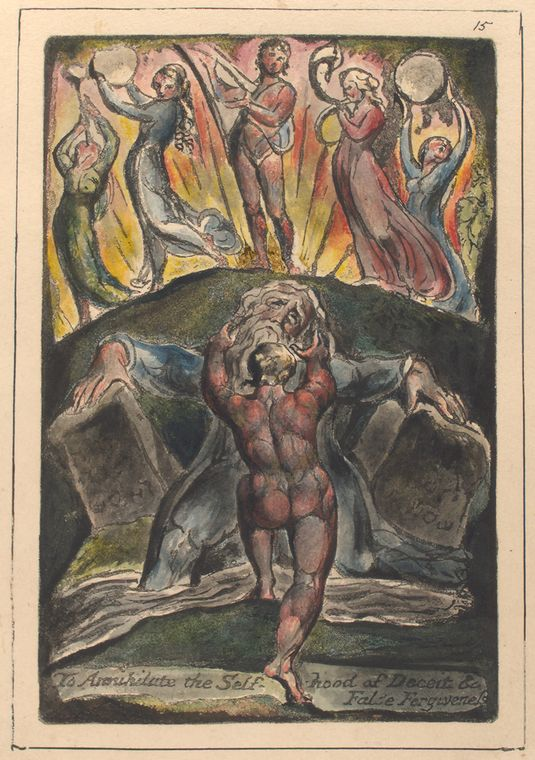
The majority of my philosophy and psychology topics revolve around the concepts of letting go of things that we are afraid to lose or cling to out of fear of the unknown. One thing that I draw a lot of allusions to and rarely mention directly is that we must also let go of ourselves. I was reading an awesome post from my friend @isaria today and it made me realize that perhaps it is something that should be addressed directly and head on. If I can figure out how to let go of myself and share my philosophical views, then others clearly have the ability too. There's no reason not to discuss it. So what does it mean to let go of oneself?
To be honest, the first time I heard anyone refer to the concept of letting go of the self it made no sense to me. I struggled with that concept for a long time and didn't really know how to take it. What part of myself do I have to let go of? Slowly over time I started working through each of my issues one by one and if you can scroll back far enough in my blog, you can read my notes and thoughts on those processes at the time. At some point it became clear that all of the defining issues I had with myself are actually what I was letting go of. The self as a thought form does not exist and we can all learn to let go of it.

When I say the self as a thought form does not exist, I can't dictate or control anyone else's understanding of what I mean anymore than they can control mine. The point is that our thoughts and perspectives of anyone or ourselves are just limiting constraints that we place on existence. I suggest thinking about it this way: If I were holding two pieces of fruit behind my back and told you that they are both fruit and you can have one, but you must pick without looking at it, then your only expectation is that I have two pieces of fruit. Whichever you choose, I bring both of my hands forward and in one hand I have an apple and in the other a banana. Immediately you would compare your choice versus the other and feel that you had either made a good or bad choice based on your preference. We all do this as it's part of human nature. If I only revealed your choice, it would be compared against the unknown and it could always be inferior or superior based on your level of comfort with the unknown and things outside of your control.
The problem is that everything exists relative to everything else, ourselves included, and the mindset that most of us have is to constantly be in a judging state of comparing what we have or do as opposed to the way that everyone else does something or what they have. This mindset is competitive in nature and what we find at some point is that someone is always more powerful, has more, or does things in a more preferable way, but living like that is madness. We exist relative to everyone and everything else, if they weren't the way they are then we wouldn't be the way we are and vice versa. If we can grasp that concept that existence is relative, then it becomes clear what we must change if we are unhappy.

We must change ourselves. All of the things we don't like about ourselves and all of the reasons we convince ourselves that things are not possible will then promptly meet us for a discussion about how drastically unprepared we are for this undertaking. You can't change yourself anymore than you can anyone else, but not for the reasons that we probably think initially. All of those thoughts that we have about ourselves and the judgments we place on ourselves are not us, and from this point many people classify those thoughts as ego thoughts. At some point though it becomes clear that the voice in our head isn't actually us. That's not the self any more than a fingernail or hair on your leg. We can call it an ego if that makes it easier to understand, but it's just a part of the whole.
The undefined self is the observer. The person listening to that voice in your head. Once we fully grasp that any thought we have of ourselves or anyone else is all relative and subjective, we can realize that defining ourselves or others is a part of the human condition and a limiting behavior in and of itself. We can struggle against that and get lost in the game that we call life and compete with all of the others, but in the grand scheme of things that is all really irrelevant as it's basically a scripted narrative from the view of the observer. The undefined self has no need to judge anything and it can love completely as it appreciates it's own self and respects the other. There is no competition to exist as we all exist. Our differences are just the contrast that give everything definition and meaning. Namaste.
"The undefined self has no need to judge anything and it can love completely as it appreciates it's own self and respects the other. There is no competition to exist as we all exist. Our differences are just the contrast that give everything definition and meaning."
Yes...and thanks for our discussion earlier...it helped so much...I have a lot of work to do.
Any time. <3
Trying to remember where it was said. But a little while ago I heard 'choose your philosophy before it chooses you' Im still working on mine!
Not a bad idea actually. A lot of people default to cynicism or stoic philosophy due to society.
Hello there Clayboyn, were you saying that this undefined self/observer is also the do-er?
It can be. :)
I think that you are referring to the "witness" position although I could be wrong. The witness is not the do-er, the witness just "is", as in your attention. The perceived doer is the ego as in the sense of "I". Again, we may be thinking about something different.
Right, but who is the do-er when you do something without thinking? Walk into a room and can't remember what you were doing? I think of the ego as more of a narrator at this point and I often find it's commentary humerus.
So, when you walk into the room without consciously thinking about it who is the do-er? Who walked in the room? You did, the sense of "I" is the do-er, your body, etc. The witness doesn't change no matter what arises or does not arise. Think of you attention, as it is. What part of the ego is attached to it? It's just eternally now. It becomes distracted by the different distractions of the mind but it is not associated with any of your egoic tendencies or narration you mention.
I like the first question best. Who is the do-er? Do they exist at all? The "I" is just a construct of our self perception. It doesn't make it any more or less real. I think trying to define consciousness is just another part of the human condition that we can't fully escape while still having the experience. If we aren't the "I" that is the construct of our thoughts and perceptions then who are we really? :)
That's the great question my friend! I think that Dr. Suess said it best in one of his books (I think the Grinch stole Christmas) it was something like "he's not a Who, he's more like a What"
If only people would grasp this truth, the world would be a better place (in my opinion)
Your piece is just along the lines of the piece I've been trying to develop. It's based on a quote I heard from my philosophy lecturer but can't remember. Something about everyone being born to see the world the same way then bespectacled by our environment and upbringing.
With the risk of drifting off your piece, I dare say that perception is more powerful than anything else.
When one realises that everything is only a matter of perspective, they become more tolerant of themselves and others and also find it easier to shed off the things they want no more in their lives
I hear ya, we can't be the actor without the set or the supporting cast. It's all necessary.
Incredible composition! Gratitude for sharing 😀
Most times, the more we want to change ourselves and remove the reflection imbibed in us by our environment and society, it's the more we sink into this mire.
Most times, we watch as observer, when our real self take actions that does not really define who we are inside.